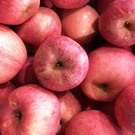With many external hurdles to navigate, 2020 was a disappointing season for Chinese Fuji apples. Sales were slow due to a weak domestic Chinese market and lower overall export volumes from the pandemic paired with increased ocean freight rates and container shortages.
With these challenges, packers still have high stock levels in their cold atmosphere storages which is later than preferred to move last season’s product.
Vanguard’s Shanghai office shares a fresh from the field update.
China has two primary Fuji apple growing regions -- the Northwest Area (ShaanXi, ShanXi, and Xinjiang Province) and the Northeast Area (Shandong and Liaoning Province). The Northwest area finished harvest at the end of September and the Northeast area completed their harvest at the end of October.
 All growers and packers will need to finish harvest and keep stock in storage before very cold winter temperatures occur. The 2021/2022 season is between 10 to 14 days late due to poor weather and slow market conditions.
All growers and packers will need to finish harvest and keep stock in storage before very cold winter temperatures occur. The 2021/2022 season is between 10 to 14 days late due to poor weather and slow market conditions.
Data pulled from the Chinese Apple Association puts the 2021/2022 total crop of Chinese apples at an estimated 45 million tonnes, which is comparable to last year’s crop size. Growers are predicting a 10-15 percent reduction in this year’s crop size. Growers are predicting this reduction is a result of the freezing temperatures the region experienced in the spring, coupled with the rain through August and September, causing imperfections to the apples appearance. That said, the eating taste of these apples is the best that has been tasted in the past few years.
As a result, more lower grade apples are coming off the packing lines and the prices for Class 2 and 3 is similar to last season. But Class 1 product is seeing 40-50 percent higher prices than last year.
Last season, Class 1 fruit tallied 30 percent of the crop. However this season will only be around eight to 10 percent. Class 2 and 3 are also experiencing reductions of 55-60 percent compared from 60-65 percent last season. The remaining is processing grade with an increase from 10 percent last year to be 30 percent on this year.
With more lower quality apples and vessel space shortages predicted, some packers are hesitant to turn to cold storage. Packers foresee the yield for exporting apples to be 20-30 percent reduced compared to last year.
Growers have high sales price expectations, but there is increasing tension between buyers and sellers in the region as growers do not want to sell Fuji apples at reduced prices and packers are looking at more low-grade product.
The higher labor costs, raw materials prices and the stronger RMB to USD paired with lower quality has many exporters and packers preparing for a challenging Fuji season ahead.
 For more information:
For more information:
Andrea Bava
Vanguard International
Tel: +1 (778) 908-1764
[email protected]
https://www.vanguardteam.com










